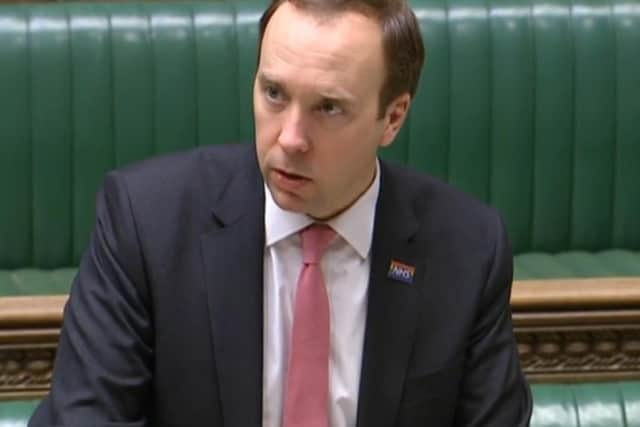Travellers who breach coronavirus quarantine rules face up to 10 years in prison and £10,000 fine
In a toughening of border rules designed to help fight the coronavirus pandemic, Matt Hancock told the Commons anyone refusing to quarantine on entering the country faces fines up to £10,000.
And he said those who are put into quarantine hotels will be charged £1,750 for their stay.
Advertisement
Hide AdAdvertisement
Hide AdUK nationals or residents returning from 33 “red list” countries will be required to spend 10 days in a Government-designated hotel from Monday.


Mr Hancock told MPs that 16 hotels have been contracted for the hotel quarantine programme, and anyone who attempts to conceal that they have been in one of those destinations in the 10 days before arrival faces a prison sentence of up to 10 years.
He also confirmed the new “enhanced testing” regime for all international travellers, with two tests required during the quarantine process from Monday.
Mr Hancock told the Commons: “People who flout these rules are putting us all at risk.
Advertisement
Hide AdAdvertisement
Hide Ad“Passenger carriers will have a duty in law to make sure that passengers have signed up for these new arrangements before they travel, and will be fined if they don’t, and we will be putting in place tough fines for people who don’t comply.
“This includes a £1,000 penalty for any international arrival who fails to take a mandatory test, a £2,000 penalty for any international arrival who fails to take the second mandatory test, as well as automatically extending their quarantine period to 14 days, and a £5,000 fixed penalty notice – rising to £10,000 – for arrivals who fail to quarantine in a designated hotel.”
He added: “I make no apologies for the strength of these measures, because we’re dealing with one of the strongest threats to our public health that we’ve faced as a nation.”
Passengers required to stay in a quarantine hotel will need to reserve a room online in advance, with the booking system opening on Thursday.
Advertisement
Hide AdAdvertisement
Hide AdThe £1,750 fee for an individual includes the hotel, transfer and testing.
These travellers will only be allowed to enter the UK through a “small number of ports that currently account for the vast majority of passenger arrivals”, Mr Hancock added.
Paul Charles, from travel consultancy The PC Agency, said he has seen a Government document indicating that hotels are only being offered £50 a night to participate, despite those on Bath Road near Heathrow Airport currently charging an average of £77 a night to members of the public.
He added: “It’s no wonder hotels are less than enthusiastic. Their costs will outstrip the income from Government.”
Advertisement
Hide AdAdvertisement
Hide AdHe also warned that the UK economy will take “a massive hit from the lack of certainty over reopening”.
Labour MP for Normanton, Pontefract and Castleford, Yvette Cooper, said one passenger arriving at Heathrow yesterday from South Africa - where a new variant of Covid-19 was identified - via Qatar “reported having no checks on her ports or tests and being just sent on her way through passport e-gates”.
Ms Cooper said she had previously raised the issue with the Prime Minister and had received assurances from Home Secretary Priti Patel that 100 per cent compliance checks were now taking place.
She told Mr Hancock: “Travellers have reported throughout that the reality is not matching the Government’s rhetoric, so why when this is so important does it appear that the most basic checks are still not happening?”
Advertisement
Hide AdAdvertisement
Hide AdMr Hancock said Ms Patel was looking into the individual case raised and added: “The measures that we announced today further strengthen the enforcement, to make sure the rules that are currently in place are enforced more strongly and indeed that we have brought in a new system of rules to strengthen the safeguards at our border yet further.”